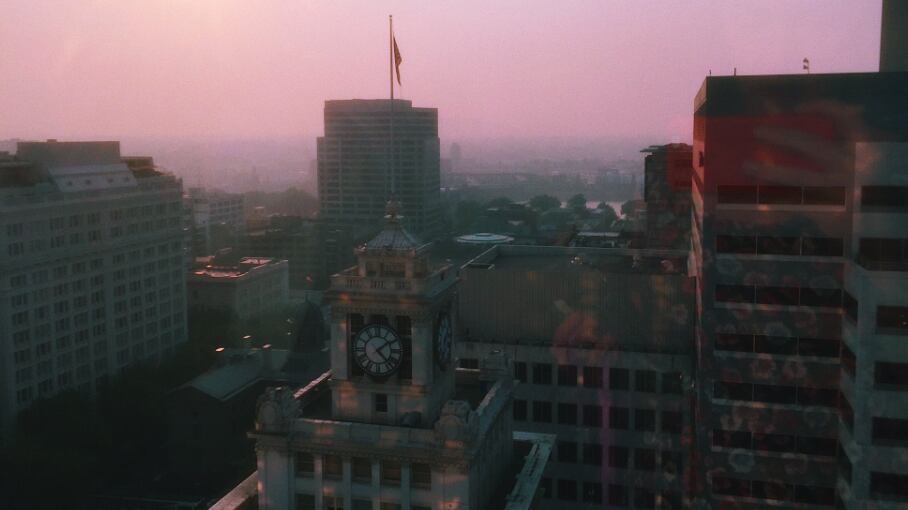This week wasn't the hottest week in the history of Portland.
But it sure came close.
On Thursday, downtown Portland reached a temperature of 105 degrees, setting a new record for August 3, which was previously just 99 degrees in 1952. Wednesday, August 2 reached 103 degrees; the old record was 96 back in 1986.
Instead of forecasted temperatures of 106 to 107 this week, the city got cloaked in smoke instead, which actually helped to keep temperatures from reaching those ultra-high temps, according to the National Weather Service.
According to the National Oceanic and Atmospheric Administration, you can still see the huge, rolling plumes of smoke covering Oregon from wildfires in the Northwest U.S. and Canada. But meteorologist Matthew Cullen says we should expect to see it start to clear up this afternoon and evening.
NEW: NOAA's #GOES16 sees rolling plumes of smoke from #wildfires in the Northwest and Canada yesterday, August 3, 2017. pic.twitter.com/CI9p5HER8y
— NOAA Satellites PA (@NOAASatellitePA) August 4, 2017
Cullen says winds from the north and northwest will push the smoke from Oregon's Whitewater Fire.
"As the winds go back Northwest, it'll push the smoke east, away from the Portland area and Willamette Valley," Cullen says. "The atmosphere has been stable the last couple days, so the smoke gets trapped closer to the surface, which is why we've seen visibility only to a few miles instead of close to 10. It's very noticeable."
That's a lot of smoke around MT Ranier from fires up in British Columbia. pic.twitter.com/WwLofh7YLC
— Jody Larose (@Netmeetme) August 4, 2017
He also explains that the other main area of smoke we're seeing comes from fires in British Columbia. Though there are currently 13 wildfires raging in Oregon and Washington, there are 24 in British Columbia.
"If new fires start or the amount of smoke coming out of the fire changes that's a source of uncertainty for us," he says. "But the bigger thing is that as the winds shift, the bulk of the smoke will mix out and move away. We haven't had a lot of good mixing; the smoke has just been settling."
Yesterday, the Department of Environmental Quality measured Portland's Air Quality Index at 174, a number which is considered to be in the "unhealthy" range, and which surpasses that of both Shanghai and Beijing. The city responded by closing Portland's public swimming pools, which are scheduled to open back up tomorrow.
The air quality had been getting progressively worse since Monday, when Portland had a 59 AQI, which is considered moderate. Wednesday, levels reached 101 AQI, which is considered unhealthy for sensitive groups.
Now, the AQI in Portland has dropped to 159, which is still considered to be in the "unhealthy" range, which starts at 151.
There are currently eight major fires dotting the state, everywhere from the Indian Creek Fire, approximately 20 miles west of Hood River to the Devil's Lake Fire, east of Klamath Falls. Washington currently has five major fires, including one in the Southwest region.
The fires prompted Governor Kate Brown to declare a state of emergency on Wednesday, allowing her to call up the National Guard.
"As Oregon faces a near record-breaking heatwave, the threat of wildfires increases," Governor Brown said in a press release. "I am thankful to the firefighters and crews working tirelessly throughout the state, and remind all Oregonians to be safe and follow posted fire bans."
British Columbia is dotted with 24 fires of note, meaning fires that are highly visible or pose a potential threat to public safety. According to a map from Natural Resources of Canada, the fire risk in British Columbia is currently at an "extreme," level, meaning fires are difficult to control, fast-spreading and high-intensity."
138(!) separate fires in British Columbia. Not normal & devastating even here in Wash. state.https://t.co/bFbJ7q3hmE #bcwildfires
— Pam Miller (@pammilpr) August 4, 2017
"After awhile it's a lot of smoke coming together," says Cullen. "It's hard to pinpoint how much can be contributed to each fire, but the total contribution is very noticeable."

